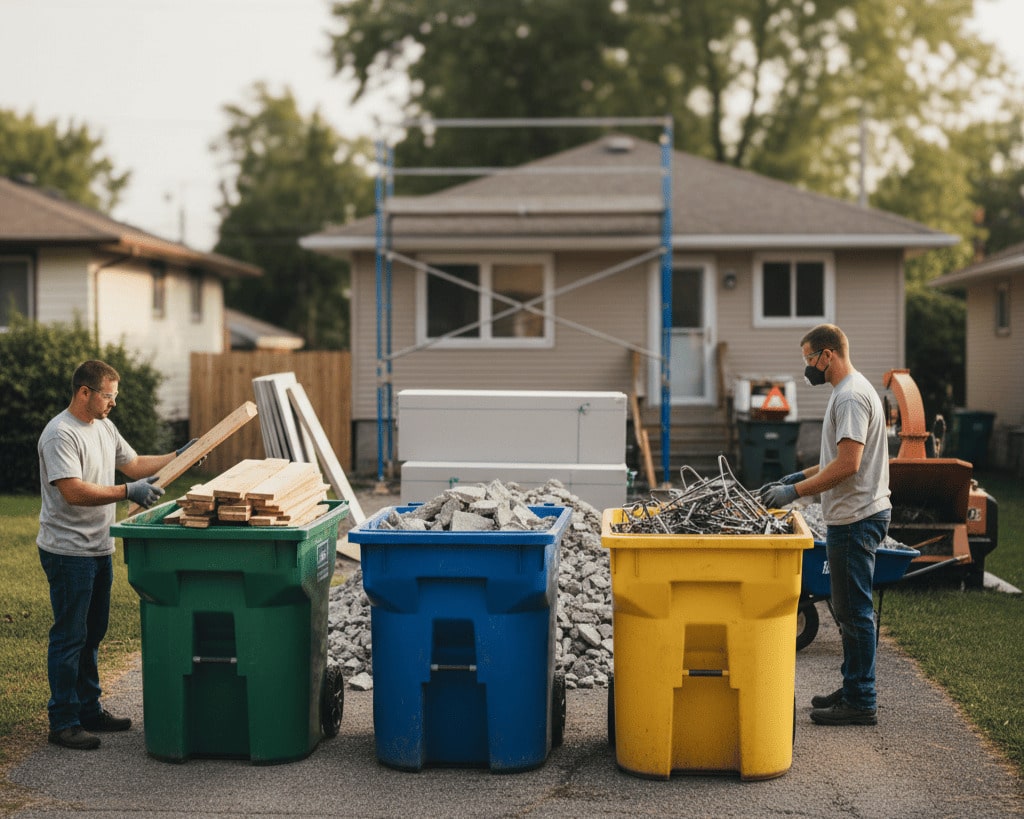Household hazardous waste shows up in basements and garages: leftover paint, solvents, motor oil, pesticides, batteries, fluorescent lights, and more. These materials need special handling. Dropping them into the blue cart, curbside trash, or pouring them down a drain creates real safety and environmental risks. This guide explains how to identify household hazardous waste, where to take it for hazardous waste drop-off in Winnipeg, how to prepare items for drop-off, and practical options when you need a convenient pickup. I’ll also explain how Mr. Garbage helps homeowners route hazardous materials safely and in line with local rules.
What counts as hazardous waste, and why does proper hazardous waste drop off matter
Household hazardous waste (HHW) includes products that are flammable, corrosive, toxic, or reactive. Common examples are:
- Leftover paints and solvents.
- Automotive fluids and used motor oil.
- Pesticides, pool chemicals, and herbicides.
- CFL and other mercury-containing bulbs.
- Propane tanks, aerosols, and certain batteries.
These items are regulated because they can harm people, wildlife, water, and soil if handled or disposed of incorrectly. Across Canada, governments and health agencies emphasize separate collection and specialized treatment for these materials to reduce accidental exposures and environmental releases. For residents, the correct response is a designated hazardous waste drop-off, not curbside recycling or regular garbage.
Where to find hazardous waste drop-off locations in Winnipeg
Winnipeg operates multiple 4R Winnipeg Depots where residents can drop off household hazardous waste. The city’s 4R depots accept many common household hazardous items and are designed to keep these materials out of the landfill and away from informal disposal routes. Popular Winnipeg depot locations include Brady Road, Pacific Avenue, and Panet Road depots — check the city’s page for hours and details before you go. City of Winnipeg
Other options include seasonal or community events and manufacturer or retail take-back programs for products like batteries, paint, and fluorescent lamps. Product stewardship programs in Manitoba also list approved drop-off sites and accepted products to help homeowners find the right place. If a depot can’t accept a particular item, you will usually be referred to a specialty collection or an authorized processor. Product Care Recycling
How to prepare items for hazardous waste drop off
- Keep products in their original containers when possible, and make sure lids are tight.
- Clearly label unidentified liquids; if you don’t know what something is, tell depot staff.
- Do not mix chemicals — mixing can create dangerous reactions.
- For aerosols and propane cylinders, follow depot instructions; some sites accept empty cylinders while others require specialist handling.
- Store items upright and in a secure, ventilated area while waiting for drop-off.
Preparing items before the hazardous waste drop off protects workers and speeds processing at the depot. If you’re unsure about a product, bring the product label or a photo to the depot so staff can advise.
What the 4R depots accept (typical list for hazardous waste drop off)
While every depot posts current accepted items, typical HHW accepted at Winnipeg 4R depots includes:
- Oil and automotive fluids (stored in sealed containers).
- Solvents, thinners, and paint-related products.
- Household pesticides and pool chemicals.
- Household batteries and rechargeable batteries (size and type rules may vary).
- Fluorescent tubes and compact fluorescent lamps (CFLs).
Always check the depot’s current list before heading out; some specialized wastes require a named processor or a manufacturer take-back program. When in doubt, phone the depot or check official city resources.
Hazardous waste drop off near me: tips to find the right spot quickly
If you search for “hazardous waste drop off near me,” prioritize official municipal and stewardship program pages in search results. City pages list depot locations, hours, and accepted materials; stewardship organizations (for paint, batteries, electronics) map collection points for their program. ProductCare Manitoba is a good local resource for paints and other household chemical collection points across the province. Product Care Recycling
Practical tip: call ahead if you have unusual items (like industrial chemicals or large propane cylinders). Depots have rules and safety procedures that vary by item and by site.
What happens to your hazardous waste after drop off
Once you deliver items to a depot, they are sorted and routed to licensed processors. Treatment may include:
- Recycling or reclaiming usable materials (for example, used oil).
- Neutralization or chemical treatment for corrosives.
- Incineration or high-temperature destruction for some hazardous streams.
Licensed processors treat and dispose of hazardous streams under provincial and federal rules, ensuring materials are handled safely and documented properly. This regulated chain of custody is why an official hazardous waste drop off matters — it prevents unsafe disposal and potential environmental releases. Canada.ca
Local examples
Renovation leftovers
A homeowner renovating a basement ended up with partially used cans of paint, cleaning solvents, and an old gas can. Instead of dumping them, they consolidated products in their original, sealed containers and drove to the nearest 4R depot. Depot staff directed different materials to their appropriate processing streams, keeping hazardous liquids out of the landfill.
Yard and garage cleanouts
Spring cleanups often turn up pesticides and old pool chemicals. Many residents set aside such materials and take them to a depot during a single trip; stewardship programs sometimes run special collection events for bulky or garden-specific chemicals. These small habits prevent accidental mixing and reduce risk to children and pets.
Expert comment: “Household hazardous waste is an everyday responsibility; it’s not a specialized problem,” says Dr. Emily Hart, a Manitoba waste-systems consultant. “Drop-off programs and stewardship systems exist so households can manage these materials without guessing. A quick trip to a depot prevents harm and keeps useful materials from becoming pollution.” (Paraphrased, local expert perspective.) Product Care Recycling
When a depot isn’t convenient
Not everyone can make a depot trip. If you need a hands-off option, a licensed hazardous-waste carrier or a reputable local service can arrange a secure pickup and route materials to the right processor. Mr. Garbage offers coordinated pickup and routing for household hazardous waste when homeowners prefer a scheduled, documented collection. Their crews follow safe handling protocols and work with authorized processors to ensure legal and environmentally responsible disposal.
Use a certified carrier or a trusted local company for pickups; avoid informal offers or anyone who suggests unregulated disposal. Proper documentation and a clear chain of custody are important when dealing with hazardous streams.
Rules, regulations, and stewardship
Federal and provincial context for hazardous waste drop off
At the federal level, Environment and Climate Change Canada provides classification and regulatory guidance for hazardous wastes; provinces implement operational rules and local programs. In Manitoba, stewardship programs and municipal depots provide the practical infrastructure for household hazardous waste collection. These layered rules ensure materials are classified, transported, and treated safely under established standards. Canada.ca
Why following rules matters
Improper disposal can create liability, contaminate soil and groundwater, and create public-health hazards. Using a designated hazardous waste drop off location or an authorized carrier ensures legal compliance and protects public and worker safety.
How hazardous waste drop off fits into Winnipeg’s broader waste picture
Winnipeg and Manitoba more broadly are working to improve diversion and responsible waste management. National indicators show that solid waste diversion varies widely across Canada; recent federal figures show national diversion around a quarter of generated waste, with Manitoba among the provinces that divert less than the national average. Increasing safe, separate collection of problem wastes like HHW helps protect local ecosystems and supports provincial goals for safer waste handling. Small actions by homeowners add up.
Practical checklist
Before you head to a depot or schedule a pickup, follow this checklist:
- Confirm depot hours and accepted items online or by phone.
- Keep products in original containers when possible and tighten lids.
- Do not mix chemicals. Transport liquids upright and securely in your vehicle.
- Label unknown containers and tell depot staff what you’re bringing.
- If you need a pickup, arrange with a licensed carrier or a reputable service such as Mr. Garbage to ensure proper routing.
How Mr. Garbage helps with safe hazardous waste drop off
Mr. Garbage offers a practical alternative when a depot trip is difficult. Key services for homeowners include:
- Guidance on what qualifies as household hazardous waste and how to prepare items.
- Secure, documented pickups coordinated with licensed processors.
- Sorting and routing so materials go to the correct treatment stream rather than to landfill.
If you prefer assistance, Mr. Garbage’s trained crews can collect household hazardous waste and ensure it reaches an approved processor, ideal for seniors, busy households, or anyone with large or awkward loads. Check Mr. Garbage’s Winnipeg service pages for details and to request a pickup. Mr. Garbage
Frequently asked questions about hazardous waste drop off
Can I put paint in the regular trash?
No. Paint, particularly oil-based paint and solvents, should be dropped off at a depot or through a stewardship program. Water-based paint may be accepted in some programs if dried and put out following local guidance, but check before you dispose. Always avoid pouring paint down drains or into the ground.
Are batteries accepted at 4R depots?
Many household batteries, including single-use and rechargeable types, are accepted through depot or retail take-back programs. Check depot lists and product stewardship sites for which battery types are accepted and whether any preparation is needed.
Do I need to schedule an appointment?
Most 4R depots accept walk-in household drops during posted hours; for large quantities or unusual items, call ahead. If you want a pickup, schedule through an authorized carrier or a trusted local provider such as Mr. Garbage.
The community benefit: why your trip to a depot matters
Proper hazardous waste drop-off protects sanitation workers, depot staff, and the environment. It prevents dangerous materials from damaging sorting equipment, contaminating recyclables, or leaching into soil and water. When households use official collection pathways, those materials can be treated, recycled where possible, and disposed of in ways that meet health and environmental standards.
Conclusion
Dropping off household hazardous waste at an approved location is a small task with an outsized benefit: it protects your family, your neighbours, and Winnipeg’s environment. Use the city’s 4R depots for the most common hazardous items, consult the stewardship program pages for product-specific routes, and call ahead for unusual materials. If a depot trip is impractical, Mr. Garbage offers secure pickup and documented routing to authorized processors so your hazardous waste is handled safely and legally.
Need help with a hazardous-waste drop off or a secure pickup in Winnipeg? Visit Mr. Garbage to request a safe, compliant pickup and keep hazardous materials out of the blue cart and out of the landfill.

